Do you love the way your Poodle sleeps in different positions? It might seem cute to watch or film them sleeping, but you might have questioned how much he should sleep and the various position meanings?
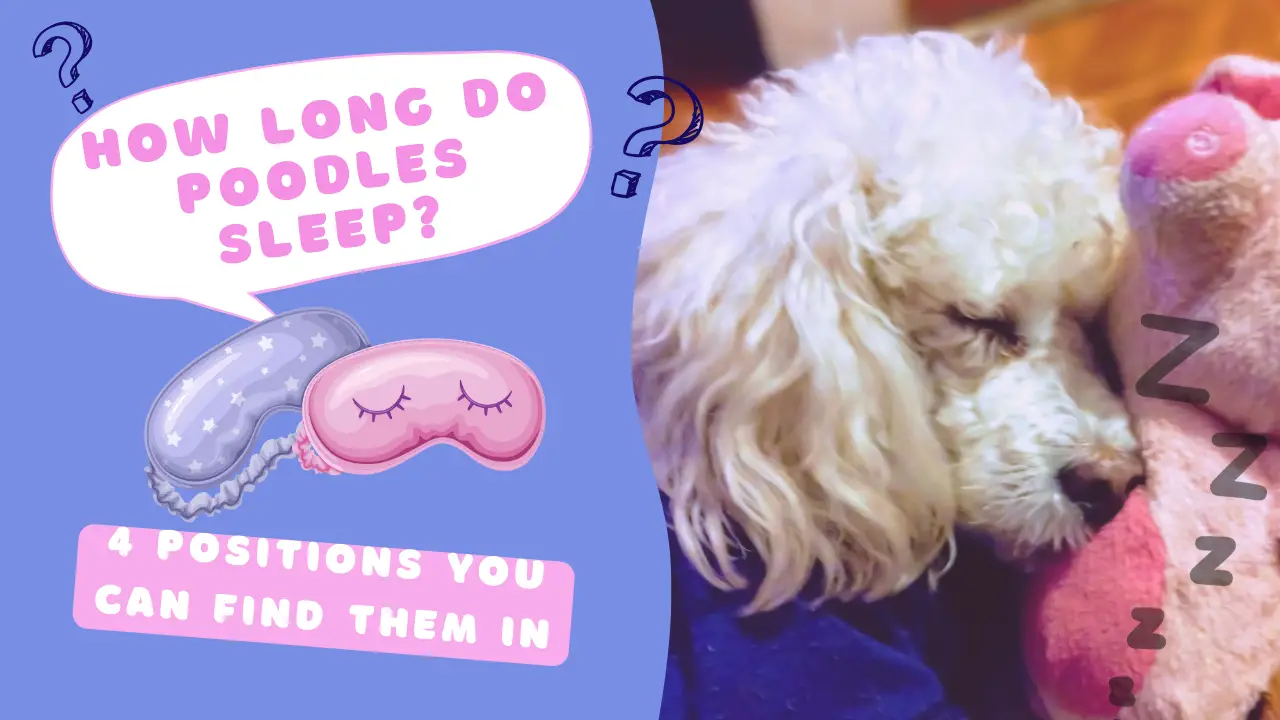
Poodles can sleep 12-16 hours per day in general as adults. In a 24-hour timeframe, Poodle puppies can spend 18-20 hours of sleep. The amount of sleep your Poodle gets is determined by their personality. So, let’s go a little more into their sleeping requirements.
What Will You Learn? 👇
How much should poodles sleep?
Each type and age of poodle will need a different sleeping routine. It’s normal for your poodle’s sleeping patterns to shift over time, and there is nothing to be concerned about. Let’s see how much sleep do poodles need in different life stages.

Read our Smart Poodles - Smart Tricks eBook for only $2.99
Dive into a treasure trove of engaging tricks and tips designed specifically for your poodle!
Newborn Pups
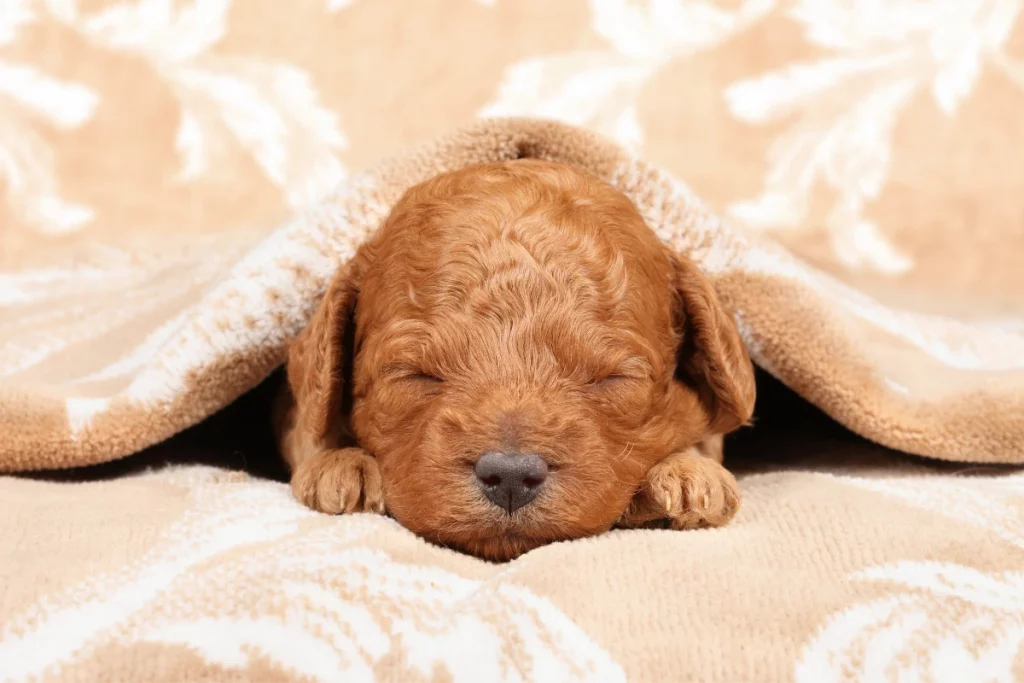
This phase of their life is relatively short and filled with a lot of sleep! Poodle newborns can sleep all the time whenever they are not feeding on their moms during the initial weeks of their lives. Newborns typically nurse approximately every two hours; however, they would close their eyes and appear to be sleeping while feeding.
They will gradually begin to invest more hours awake once they get older. During the age of three weeks, newborns can have 2-4 hours of playtime every day, divided into a short duration of activities and understanding their surroundings.
Poodle Puppies
Puppies will experience lots of changes in their bodies as they grow. To nourish and energize their expanding bodies, they require a lot of sleep. Poodle pups spend time sleeping 18-20 hours every 24-hours when they are 2-5 months old. This covers both nighttime and daytime sleep.
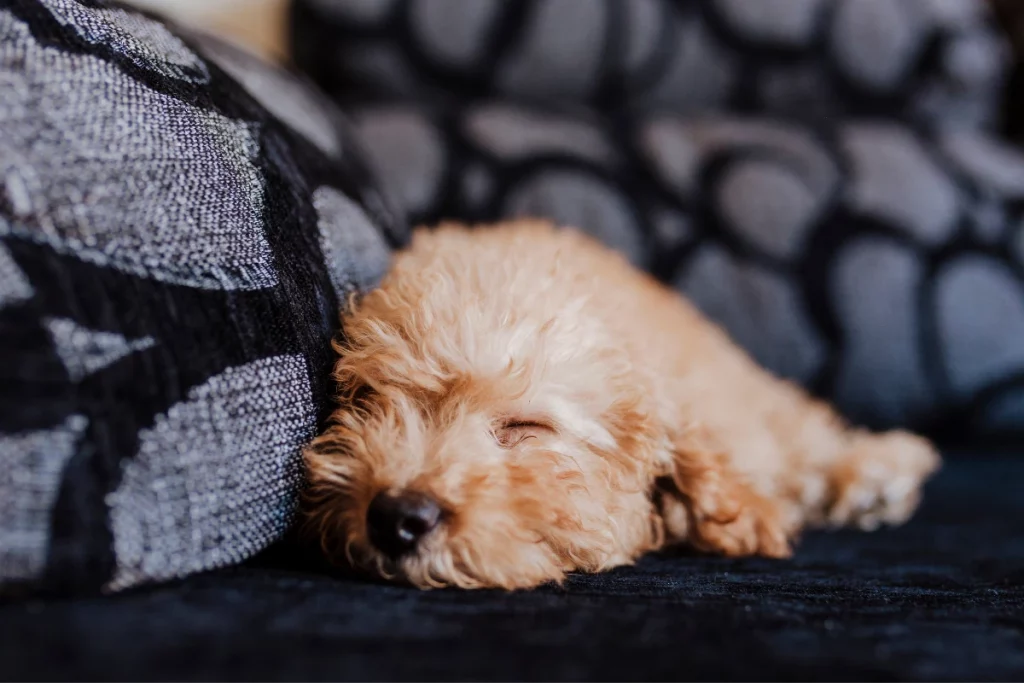
Your pup may sleep for longer durations at nighttime, but it would also want to wake up and empty its bladder. It might even get a blast of excitement and will want to have a playtime with you. With plenty of effort and encouragement, your pup will begin to sleep at night by four months of age or sooner.
Puppies between the ages of 6 and 12 months can sleep for 14 to 16 hours in a 24-hour cycle. Around this time, they would be more energetic and curious throughout the day and would sleep properly at night for 6-9 hours.
Adult Poodles
An adult Poodle usually sleeps for 12-16 hours in 24 hours on average; however, it would sleep more than that as it gets older. Researchers discovered that elderly and middle-aged canines sleep more throughout the daytime than adult canines in research. It was because they had frequent short naps rather than longer naps. As a result, they expend greater energy and require more relaxation than the younger generation.
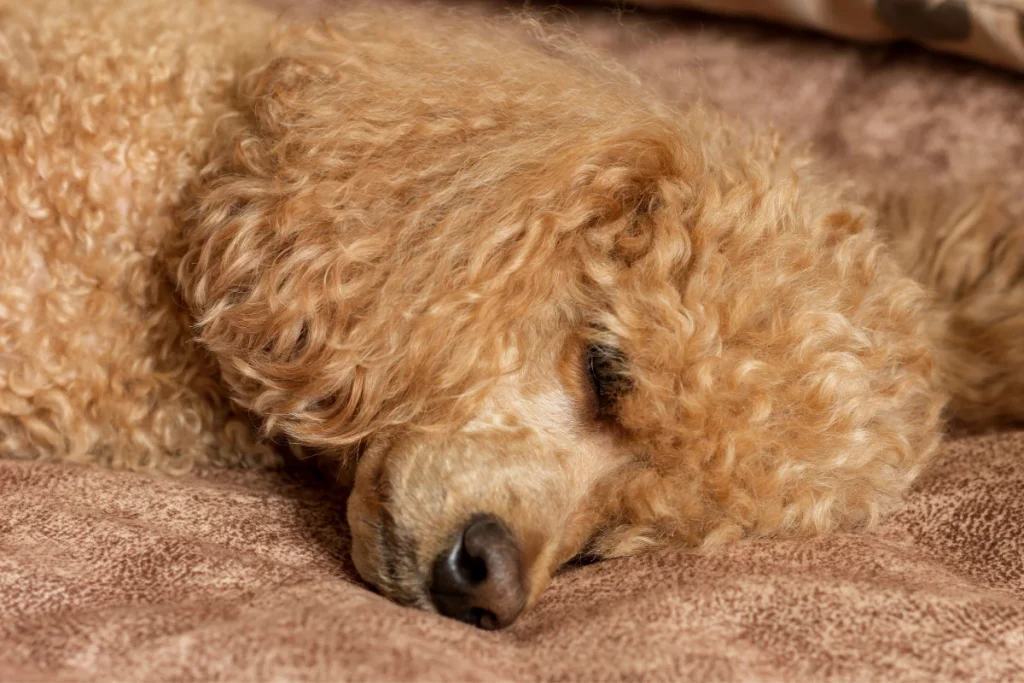
It’s worth noting that this varies a lot based on every canine’s behavior, personality, and also the environmental factors of your house. Poodles being a herding dog, enjoy staying energetic and offer a task to complete. They might have better stamina than some other dogs and, comparatively, sleep less than the rest.
Some pet parents also feel that if their canines are left by themselves for several hours at home, they will simply sleep because there is no one with them to play with or take them out for fun activities.
Senior Poodles
When your Standard Poodle reaches the age of seven, it is labeled an elder dog. At this point, you would notice that your canine is gradually increasing its sleeping duration.
Just like humans, your senior poodle will not have the same amount of energy as they grow old. Senior Poodles nap for 14-16 hours every day in general, but as they become mature (around 10-14 years old), they may rest up to 18 hours per day.
Your Poodle’s sleeping habits may vary as he gets older. It’s natural for your dog to sleep more throughout the daytime and wake up sometimes at night. Unless there is a dramatic or significant shift, this habit will most likely occur gradually, and you should not be concerned about it.
It’s essential to visit your veterinarian if your Poodle’s sleeping patterns have changed suddenly or significantly. These might be symptoms of more severe disorders in senior poodles, like dementia, joint problems, hypothyroidism, and other age-related illnesses.
Your Poodle could be having trouble sleeping as its bladder ages and will have to pee frequently. You might assist them by training them to pee before sleeping at night or decreasing their water consumption before bedtime.
Should I let my poodle sleep with me?
Many people who adopt a puppy let it sleep with them in their bed. This topic has a lot of varied opinions and suggestions on whether it’s a good idea or not. Ultimately, it is up to you as the dog parent; however, I will go over the advantages and disadvantages of each.
Allowing your poodle to sleep with you in your bed can provide several advantages. It also has the same effect even if your dog is not in your bed, but is sleeping in the same room. Also allowing your pet to rest on your bed may be a wonderful bonding moment, particularly if you are separated from your canine for several days. Here are a few examples of what can you expect:
- Reduces anxiety and stress
- Increased warmth
- Better safety
- Love and hugs in the morning
- Decreases loneliness
- Better bonding with your pet
- Give your pet a sense of security
Sleeping with your Poodle increases your amounts of Oxytocin, a potent chemical that would keep you calm, relax, decrease stress, and reduce your pulse rate.
According to a study, pet parents who form strong connections with their canines have lots of mental health benefits like lower blood pressure, reduced stress, relatively low depression and anxiety symptoms, and improved well-being.
But, there are several factors to consider before deciding whether or not to allow your dog to sleep with you like:
- The quality of your sleep might be compromised
- Might aggravate allergies
- Possibility of transmission of infection if your dog is sick at the moment
The sleeping schedules of dogs and humans may be surprisingly different. So if you and your pet are light sleepers who wake up frequently, it may be tricky to obtain a good sleep. If either of you and your pet is not getting proper sleep, then it is best to get your pet his own bed.
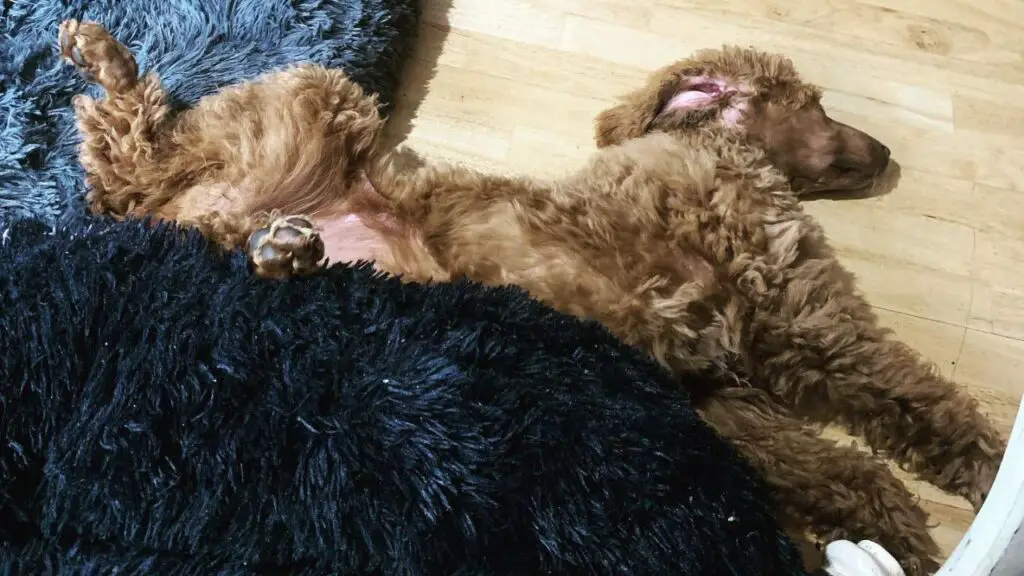
If you own a poodle puppy, you would have to change your sleeping position, which is safe for your pet. You should avoid having your dog lie in bed with you even if you’re a light sleeper or frequently switch sides. Furthermore, you wouldn’t want to hide them beneath the sheets, particularly pups, as they may suffocate quickly.
Even if every person has thoughts on whether or not your Poodle should lie on your bed with you, eventually, it is up to you to make the final decision.
Where should my poodle sleep?
As I said before, you need to make sure your pet gets enough and good sleep to stay healthy and active. Canines like to rest in an environment that makes them feel warm and secure.
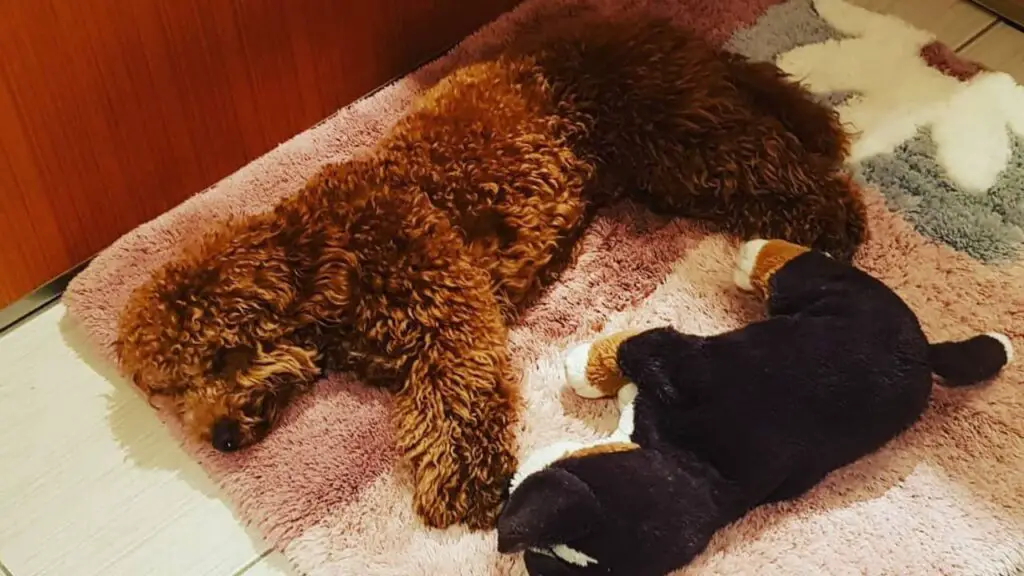
According to several poodle parents’ opinions, providing your poodle its own bed is the ideal approach that helps them feel secure while resting or sleeping.
Can a poodle sleep outside?
If you want to bring a canine to your house but can’t keep it inside, a poodle is not the ideal breed for you. The reason is, leaving your poodle outside might put them at risk of getting a disease or experiencing distress.
Poodles could be allowed outdoors for a short time, but not for their entire life. A standard poodle is the most OK pick if you want to keep it outside. Miniature and toy poodles would not adapt well to the outside environment, so they could only survive inside the house.
Miniature or toy breeds have less fat and body mass to help them survive and are more sensitive than standard poodles. Smaller canines have more difficulties adjusting to climate changes and are more sensitive, whereas standard poodles are stronger and have essential fat for extreme conditions.
| Risks during hot weather | Risks during cold weather |
|---|---|
| Dehydration | Cracked nose and skin |
| Sunburn | Cracked paws |
| Burned paws | Hypothermia |
| Heat exhaustion or heat stroke | Dehydration |
| Getting ill |
How to get the poodle to go to sleep?
If you’re having trouble convincing your Poodle to fall asleep at night, you’re not the only one. Many parents have been through this period at some time if it’s when they first get their puppy or when they relocate.
Crying or whimpering during the night, waking up at strange times during the night, failing to sit quietly, or waking up too early in the morning are all factors that make this difficult. Some dogs may keep sleeping all night, and then a few days or weeks later, they may wake up all of a sudden. This one is known as a sleep regression and is quite common.
When pups are teething or experiencing physical growth, they may stay up all night or even experience difficulty sleeping, much like human newborns. Thankfully, there are still some measures you can take to assist your pet in getting the rest they require.
- Have a sleeping schedule and proper routine:
When your Poodle understands what to anticipate and has particular signs to remind him that it is getting late and he should get some rest, it could help him fall to sleep more quickly. This process may involve going to the bathroom, lowering the TV volume, reducing the lights, and establishing a pleasant and peaceful environment.
It’s essential to stick to this routine as much as possible. Heading to bed at the right hour every night and following a routine would indicate to your pet’s brain that it’s time for a shut-eye.
- Give them lots of exercises:
Poodles are incredibly bright and also have an inherent urge to work because they were specifically bred for hunting purposes.
Every day, a poodle requires a lot of enthusiasm and training. If they’ve been restless and lazing about all day, their odds of getting a decent night’s sleep are little to none.
The optimal time for a great workout is around 2 hours before going to bed. Include high-intensity cardio training and also stimulating cerebral tasks to ensure that your dog is physically and intellectually exhausted.
- Provide them a warm and comfortable sleeping area:
A canine bed should always be beside your bed and not in some other room. Also, having their personal bed would help them get used to sleeping alone. If your Poodle sleeps in his bed or kennel, having anything which smells similar to you along with a plush toy to cuddle with might make him feel safer and more comfortable. It is particularly true when it comes to pups.
- Try adjusting their mealtimes and reducing water intake:
Reduce their water intake after a fixed period in the evenings. Whenever your Poodle is constantly demanding a toilet trip during the night, consider adjusting his dinner time to a couple of hours sooner (so that he could pee before bedtime) or later.
You might even put the water bowl away a couple of hours before going to bed, ensuring he doesn’t overfill his bladder right before falling asleep. In any case, you might want to gradually modify his feeding times to determine whether it helps with the night-time toilet trips.
- What is causing them to wake up early in the morning?
Is the sun about to rise? Consider putting up some blocking blinds. Could there be a lot of noise, like chirping or early hours traffic? Consider buying a noise cancellation machine to see if it helps.
All that it requires is a little extra effort to find out what is really causing the trouble. Keeping a track or diary of your pet’s resting and feeding routines might make this easier. It will not be a permanent step, but it will help you find a pattern that seems abnormal so you can find a way to solve the matter.
If your Poodle appears to be fatigued and tired the entire day, and shows signs such as throwing up, indigestion, bloody feces, or other issues, you must consider taking him to the vet right away for a full-body checkup.
If you own a poodle pup and also have addressed all of its requirements, but he is still weeping, note that it is normal for a newborn to moan and whine during the initial weeks he gets in your house. But, again, this is a typical sign of separation anxiety from the mom and the litter.
It can also happen to an adult dog that is unfamiliar to your house. If you have to monitor him, keep in mind that the lights are dimmed and that you are as quiet as possible. If you’re trying to get your poodle pup to sleep in their bed or crate, don’t lose hope and expect everything to go smoothly. You should have some patience and keep working on it until he gets comfortable sleeping alone.
Poodle favorite sleeping positions
The postures in which canines sleep, their wiggling and moving style, and how long they rest may disclose a lot about what they’re experiencing.
Sleeping patterns might provide information about a canine’s health and comfort if you try to search for it. However, if you notice anything abnormal or strange about your pet’s sleeping habits, you should schedule an appointment with your veterinarian. Here are some funny positions that you can find them in.
Crazy Legs
I’m sure you’ve noticed your pet laying on his backside with all four legs raised; this is known as crazy legs. According to studies, canines who nap in this posture are more docile and sensitive. His tummy is entirely exposed when he raises his legs like this.
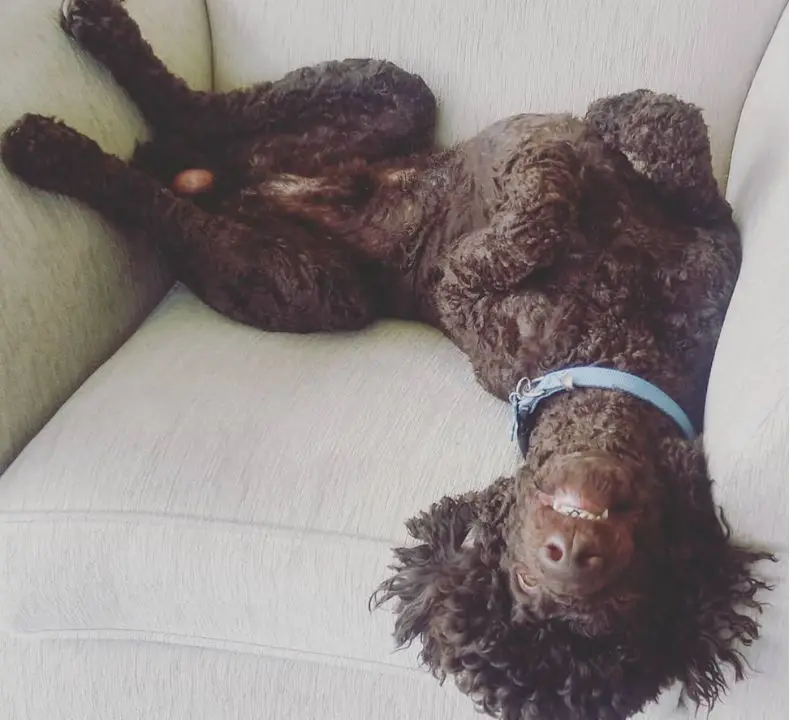
If your pet sleeps like this, it suggests they are self-sufficient and feeling secure. In any event, whenever a canine does the Crazy Legs, he is informing his loved ones that he is completely at peace and happy.
Side Sleeping
It is a pretty common posture in puppies. According to NextGen Dog experts, this posture is intended solely for napping. Some canines, on the other hand, sleep for longer durations.
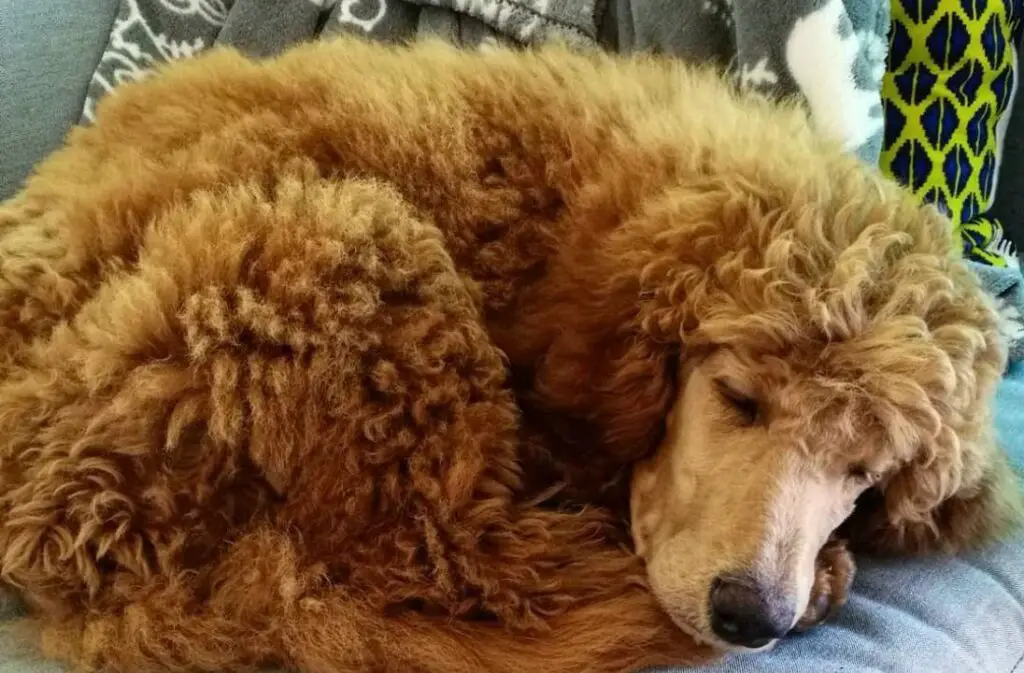
The posture is more pleasant than the crazy legs, and it nonetheless exhibits complete faith, with the canine feeling confident enough to reveal his stomach. Canines who nap in this style are quite relaxed and unbothered. Side sleepers are also said to be happy canines.
Superman
Superman is among the coolest positions, according to research. This pose is designed to look like Superman flying. The canine is resting on his stomach with all his legs extended out in front of him.
They prefer this posture because it allows them to get up more quickly than other postures and proceed with their ongoing task. As an outcome, the Superman pose is clearly descriptive of a lively, active dog!
Passed Out
It is extremely close to the napping posture of the crazy legs. According to experts, the passed-out posture might indicate hyperthermia. The pet’s paws have sebaceous glands, and their stomach has a thin coating of fur, which makes this posture ideal for cooling down. Keep in mind that if your pet’s paws are folded above its heart when ‘Passed Out,’ that’s a sign that they would not like to be disturbed.
Conclusion
Poodle ownership is both pleasant and demanding. Poodles are easy to train, and you can gradually set up a good sleep routine for them.
Adult poodles rest for 12-15 hours every day, but poodle pups nap for 18-20 hours a day. Poodles’ sleeping habits are mostly determined by their size, maturity, and temperament. They are more prone to adopt their masters’ sleeping patterns.
As a result, you can make a routine for your pet to sleep with you. Help your pet by making their sleeping environment comfortable and peaceful. If you address any sleeping abnormality, it is best to talk to your vet and come up with a solution.
Marko is the founder and author at PoodleHQ, where he blends profound expertise with formal training in Animal Behavior and Canine Genetics. With multiple generations of poodles under his care, he’s a breed connoisseur, honored with the Canine Care Excellence Award and lauded by the International Pet Enthusiasts Association.


Thank God I found this article 🙌 I just learned a ton of things about my mini poodle. I’m excited 😊, thank you.